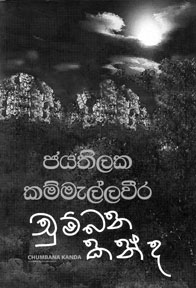Novelist Kammellaweera as myth-seeker
Reviewed by Kalakeerthi Edwin Ariyadasa
Sinhala fiction, has entered into a period of relentless exploration.
Birth-pangs of new modes of fictional expression, have been widely felt
in the last ten-fifteen years.
Cumulatively, these emerging voices of Sinhala fiction, have showed
in, what could be characterized as a post Gunadasa Amarasekera era of
the Sinhala novel.
 The predominant pre-occupation of the novelists of this movement, has
been the committed effort, to cope fictionally with the stirring social
and cultural changes of our day. The predominant pre-occupation of the novelists of this movement, has
been the committed effort, to cope fictionally with the stirring social
and cultural changes of our day.
They differ significantly from the story - tellers of the previous
days, due primarily to their persistent focus on technique. To them,
"how" is as important as "what".
In the vanguard of this coterie of new story - tellers, are Kathleen
Jayawardene, Sumithra Rahubadda to name a handful.
With his current work of fiction, "Chunibana Kanda" (kissing Rock),
Novelist Jayatilaka Kammellaweera, enters decidedly into this new
movement of Sinhala story - tellers.
In the opening segment - of this novel, the reader will be pleasantly
surprised to come upon some of the most efficiently crafted pieces of
prose in current Sinhala fiction.
The preamble to the central story, is painstakingly detailed. His
word-pictures are visually evocative.
The sense of peace, quietness and tranquillity that pervades the
forested landscape associated with the "Kissing Rock", is contrasted
with the pains, privations and the incarceration of the rebel days.
The appeal of Jayatilaka Kammellaweera's novel, depends partly on a
deep-seated yearning most people (especially the city dwellers) nurse,
for a quiet life in the wilderness, It is an escapist dream. The forest
provides a cosy cocoon, away from the imperatives of time. Compelling
routines do not dominate you there.
Novelist Kammellaweera deftly exploits this potent attraction of
forest -life. To me, his central character. "Sinhaya", is a kind of Sri
Lankan incarnation of Deniel Defoe's "Robinson Crusoe." Carving out a
life from the meagre resourceses, the wilderness could offer, is a
perennial human adventure.
As the story progresses, the reader becomes increasingly aware of the
emergence of a cult. The mysterious presence in the wilderness, takes on
the guise of an esoteric spiritual figure.
The central - character, decides to convert a rock - cave into a
sacred temple. He improvises a "god" and initiates the worship himself.
Soon, the anonymous "deity" acquires a following of ardent adorers.
A myth is born.
One cannot be quite certain whether this is the author's ironic
comment on the mushrooming cults, that achieve vast devotee-followings
and eventually die off in a whimper
The myth he creates, begins to overwhelm him. He is overcome by a
troubling sense of possessiveness and is keen to keep the envious
villagers, off his forest domain.
The carnal temptation of the rebel - turned - recluse, forms an
episode, that brings about a significant transition in the narration.
His exotically disturbing encounter with the passion - drenched
female, shakes the 'recluse' to the very depths of his being.
At the beginning, the "quest" of the central character "Sinhaya", had
the vague resemblance to a spiritual search.
The "temptation" and the subsequent "fall", totally altered the
course of his settled and tranquil life as a content forest dweller.
When he leaves his forest - haunt, and embarks upon a search for the
temptress, the story tends to take on a new turn.
But when the search for the "women', proves futile, he comes back to
the all - powerful "kissing - Rock", sternly determined to continue is
reclusive way of life.
But, the world outside, intervenes. The intrusion of the outside
world, appears in several forms. There is the mass - meditation leader
who is keen to have one of his popular camps in the forest domain of the
reclusive 'lion'.
Then comes a politician, who brings in, the intrigues and the value
systems of the popular politicians.
One cannot help but feel, that these demands, begin to affect, the
keen focus of the narration, that compelled the reader in to tranced
absorption, early in the novel.
The narration's admirable potentiality to appeal, tends to relax. The
elements of mystery, the sense of wholesome curiosity that held the
readers unswerving attention,, seem to have waned in the seeme parts of
the novel.
This is partly due to the sensational episodes, that are introduced
to the story -line, in the wake of the arrival of the protagonist's
politician friend.
When everything is said and done, Novelist Jayatilaka Kammallaweera's
latest work of fiction, is a district enrichment of his literary genre.
I am especially impressed by the exceptional craftsmanship of his
prose in this work.
He infuses fresh expression vigour to many words and usages he has
culled from demotic parlance.
|

